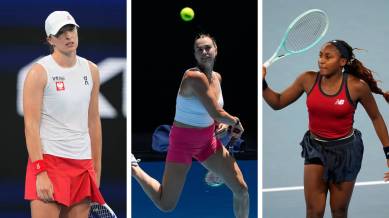Australian Open 2025: Iga Swiatek seeking normalcy post doping ban as Aryna Sabalenka, Coco Gauff have raced ahead on hard courts
Australian Open: With Osaka guided by Serena Williams' former coach Patrick Mouratoglou, and Goran Ivanisevic in Elena Rybakina's corner, the first Slam of 2025 season is simmering with contenders

A day after he had won the Cincinnati Masters title, news dropped of Jannik Sinner’s failed dope tests and suspicions swirled regarding his immediate exoneration. Despite the enormous media interest and raised eyebrows from peers in the locker room, a few weeks later he won the US Open and ended the year as World No. 1 after one of the most successful ATP seasons.
A similar task lies ahead for Iga Swiatek, the women’s World No. 2 and five-time Major winner, who arrives at the Australian Open, starting Sunday, for her first major event since being banned for one month for testing positive for the banned substance trimetazidine, which she, like Sinner, successfully appealed was a case of accidental contamination with her sleeping medication.
With a different personality and coming into the year in patchy form, Swiatek, who has not always been immune to tempestuousness, must find the resolve that Sinner found to block out the noise behind her and succeed on the big stage in what will be the most daunting challenge of the Polish 23-year-old’s career so far.
Already facing accusations of a lack of transparency and favouritism regarding anti-doping controls, Swiatek’s case heightened the scrutiny for tennis’s governing bodies even more. In November, it was announced that Swiatek had accepted the month-long ban — essentially a plea bargain — retroactively between September and October, meaning her absences from tournaments in that time for ‘fatigue’ and ‘personal matters’ were really due to a doping violation that had been concealed from the public.
Sceptics of the system, having already raised concerns during the Sinner case, spoke out against what seemed like another case of preferential treatment, when lower-ranked players have had year-long bans despite testing positive due to accidental contamination.



